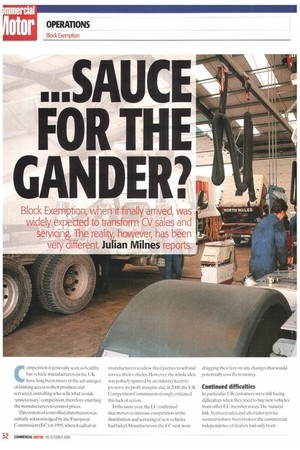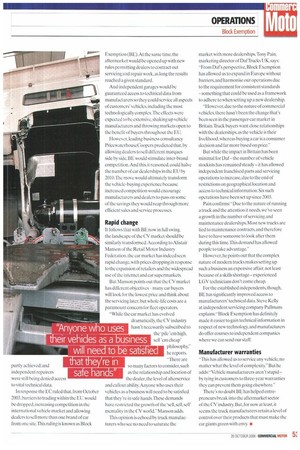Block Exemption, when it finally arrived, was widely expected to
Page 52

Page 53

If you've noticed an error in this article please click here to report it so we can fix it.
transform CV sales and servicing. The reality, however, has been very different. Julian Milnes reports.
Com petition is generally seen as healthy, but vehicle manufacturers in the_ UK have long been aware of the advantages of limiting access to their products and services. Controlling who sells what avoids 'unnecessary competition, therefore enabling the manufacturers to control prices.
This system of controlled distribution was initially acknowledged by the European Commission (EC) in 1995, when it called on manufacturers to allow third parties to sell and service their vehicles. However, the whole idea was politely ignored by an industry keen to preserve its profit margins and, in 2000, the UK Competition Commission strongly criticised this lack of action.
In the same year, the EC confirmed that moves to increase competition in the distribution and servicing of new vehicles had failed. Manufacturers, the EC said, were dragging their feet on any changes that would potentially cost them money.
Continued difficulties
in particular, UK customers were still facing difficulties when they tried to buy new vehicles from other EU member states.The 'natural link' between sales and aftersales service seemed to have been broken: the commercial independence of dealers had only been partly achieved; and independent repairers were still being denied access to vital technical data.
In response the EC ruled that, from October 2003, barriers to trading within the EU would be dropped. increasing competition in the international vehicle market and allowing dealers to sell more than one brand of car from one site.This ruling is known as Block Exemption (BE).At the same time. the aftermarket would be opened up with new rules permitting dealers to contract out servicing and repair work, as long the results reached a given standard.
And independent garages would be guaranteed access to technical data from manufacturers so they could service all aspects of customers' vehicles, including the most technologically complex. The effects were expected to be extensive, shaking up vehicle manufacturers and throwing markets open to the benelit of buyers throughout the EU.
.However, leading business consultancy PricewaterhouseCoopers predicted that,by allowing dealers to sell different marques side by side. BE would stimulate inter-brand competition.And this, it reasoned, could halve the number of car dealerships in the EU by 2010.The move would ultimately transform the vehicle-buying experience because increased competition would encourage manufacturers and dealers to pass on some of the savings they would reap through more efficient sales and service processes.
Rapid change It follows that with BE now in full swing, the landscape of the CV market should be similarly transformed. According to Alistair Manson of the Retail Motor Industry Federation, the car market has indeed seen rapid change, with prices dropping in response to the expansion of retailers and the widespread use of the internet and car supermarkets.
But Manson points out that the CV market has different objectives -many car buyers will look for the lowest price and think about the servicing later, but whole-life costs are a paramount concern for fleet operators.
"While the car market has evolved dramatically, the CV industry hasn't necessarily subscribed to the 'pile 'em high, sell 'cm cheap' philosophy,he reports. "There are so many factors to consider, such as the relationship and location of the dealer, the level of afterservice and callout ability.Anyone who uses their vehicles as a business will need to be satisfied that they're in safe hands.These demands have restricted the growth of the 'sell, sell, sell' mentality in the CV world," Manson adds.
This opinion is echoed by truck manufacturers who sec no need to saturate the
o uses s a iusiness
market with more dealerships. Tony Pain, marketing director of Daf Trucks UK, says: "From Des perspective, Block Exemption has allowed us to expand in Europe without barriers, and harmonise our operations due to the requirement for consistent standards -something that could be used as a framework to adhere to when setting up a new dealership.
-However, due to the nature of commercial vehicles, there hasn't been the change that's been seen in the passenger-car market in Britain.Truck buyers want close relationships with the dealerships, as the vehicle is their livelihood, whereas buying a car is a consumer decision and far more based on price."
But while the impact in Britain has been minimal for Daf the number of vehicle stockists has remained steadyit has allowed independent franchised parts and servicing operations to increase, due to the end of restrictions on geographical location and access to technical information. Six such operations have been set up since 2003.
Pain confirms:"Due to the nature of running a truck and the attention it needs, we've seen a growth in the number of servicing and maintenance dealerships. Most new trucks are tied to maintenance contracts, and therefore have to have someone to look after them during this time.This demand has allowed people to take advantage," However, he points out that the complex nature of modern trucks makes setting up such a business an expensive affair, not least because of a skills shortageexperienced LGV technicians don't come cheap.
For the established independents, though, BE has significantly improved access to manufacturers' technical data. Steve Kelly at independent servicing company Pullmans explains:"Block Exemption has definitely made it easier to gain technical information in respect of new technology, and manufacturers do offer courses to independent companies where we can send our staff.
Manufacturer warranties "This has allowed us to service any vehicle, no matter what the level of complexity." But he adds: "Vehicle manufacturers aren't stupidby tying in customers to three-year warranties they can prevent them going elsewhere."
There's no doubt BE has helped entrepreneurs break into the aftermarket sector of the CV industry.But, for now at least, it seems the truck manufacturers retain a level of control over their products that must make the car giants green with envy. •
























































































































































































